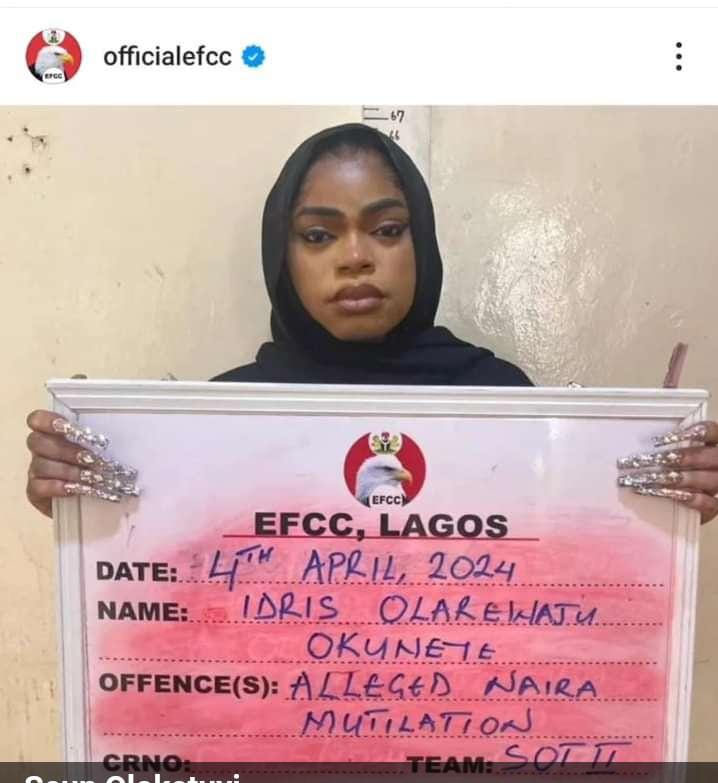Bobrisky served term in correctional centre- Report
A Report by Federal Government’s Independent Investigative Panel has revealed that there was no evidence indicating that Idris Okuneye (Bobrisky) lived outside the Correctional Service centre within his six months of imprisonment. The report by the panel, set up by the Minister of Interior, Dr Olubunmi Tunji-Ojo, to look into allegation of gross violation of […]

Bobrisky
A Report by Federal Government’s Independent Investigative Panel has revealed that there was no evidence indicating that Idris Okuneye (Bobrisky) lived outside the Correctional Service centre within his six months of imprisonment.
The report by the panel, set up by the Minister of Interior, Dr Olubunmi Tunji-Ojo, to look into allegation of gross violation of standard operating procedures within the Nigerian Correctional Service (NCos), was submitted on Monday in Abuja.
Presenting the report to the Minister, Mrs Magdalene Ajani, President of the panel and Permanent Secretary Ministry of Interior said it was the first phase.
She said the report contained findings regarding Bobrisky and allegations against some personnel at the Kuje Correctional Centre by Abdulrasheed Maina.
- We’ve sold bread worth N300m in 5months – BIPC
- EFCC: Those Challenging Our Legality Feeling The Heat
Ajani said the findings revealed that Bobrisky enjoyed several special privileges while in custody at the Medium-security and Maximum-security custodial centres, Kirikiri, Lagos.
“He had furnished single cells, humidifier, rugged floor and lots of visits by his family members and friends as he desired. Visits were also held inside the office of the officer in-charge of the custodial centre.
“He also enjoyed the privileges of self-feeding, designated inmate to run errands for him, access to fridge and television, and possibly access to his phone,’’ she said.
She, however, underscored the need to further investigate, if the privileges were financially induced and based on corrupt practices by correctional officers.
Ajani noted that the peculiarities and physical appearances of the responder probably led to the special treatments he received by the correctional officers.
According to her, findings revealed that, the decision to transfer Bobrisky from Ikoyi custodial centre, to the Medium maximum centre was made by Ben Freeman, the then, State Controller, NCos Lagos Command.
“The state controller however, has the power by law to transfer inmates within the same state.
“Proper documentation was, however, not made prior to his transfers but the documents were later provided and backdated.
“This is in violation to Section 168 and 169 of the NCoS service standing order, and the transfer of Bobrisky being a first offender violates section 16 4(a) (b) of the Ncos Act, 2019,” she added.
The president of the panel said that the committee proposed that in future, provisions should be made available for peculiarities such as Bobrisky’s case.
According to her, steps should be taken to avoid the obvious discriminatory practices in relation to the socio-economic levels and other status of inmates.
In the same vein, the panel report indicated that, it was true that a senior officer collected funds from Maina’s son.
According to her, the panel, upon interrogation of the officer, discovered that money was paid into his personal account.
“The officer claimed that the money paid into his personal account was for the purpose of catering for Maina’s welfare and health.
“He acted unethically and brought himself and the service to great disrepute by requesting and receiving money from Maina’s son.
“The panel is of the view that, even if the transfers were made with Maina’s approval, it is still a violation, as the officer’s conduct was not consistent with institutional regulations,” she said.
The panel therefore recommended that all correctional service personnel should “be re-trained and be persons of integrity and character’’.
The panel also recommended that personnel without previous direct heading of a custodial center should not be deployed to head big and sensitive custodial centers.
“The gross under-funding of the Nigerian correctional service, poor welfare package and working conditions of correctional officers are factors that encourage corruption and commercialisation of provision of welfare and other services to inmates,” Ajani said.
Responding, the minister said that any officer found culpable based on the report would face disciplinary actions.
“We have nothing to hide and it is about reform and making sure we build strong institutions that will outlive every one of us, and the correctional service is a key institution in the security architecture.
“We will follow this up with action and make sure we build a service that will not be condemnatory to inmates.
“We want to reform the service in a way that it will be the bridge between the weak and the strongest,” he said.
The minister assured that it would no longer be business as usual, adding, “the renewed hope starts with us in this ministry”. (NAN)
